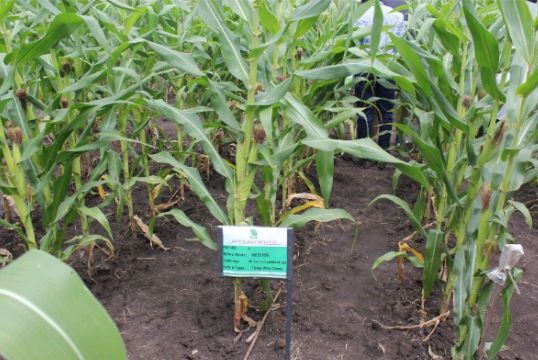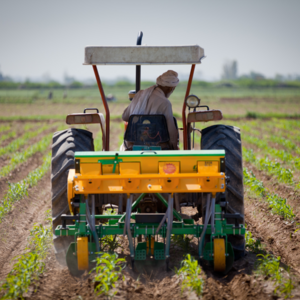In the media
Kenya: Scientists team up to control fall army worms
 Environmental health and biodiversity
Environmental health and biodiversity
Source: Agro News (9 Nov 2022)
Scientists are working to contain the spread of fall armyworm in Kenya with naturally resistant varieties and eco-friendly solutions.
‘Perennial’ rice saves time and money, but comes with risks
 Nutrition, health and food security
Nutrition, health and food security
Source: Science (7 Nov 2022)
Research on rice crops that do not need replanting in China is showing promising results for yield, finances and labor, and the environment.
Farmers introduced to stress-tolerant hybrid maize varieties
 Environmental health and biodiversity
Environmental health and biodiversity
Source: Ghana Business News (2 Nov 2022)
A field day in Ghana organized by the AGG project supports farmers to adopt maize varieties with tolerance to stress.
Kenya Lifts 10-year Ban On GM Foods, Allows Open Cultivation, Importation Of White GM Maize
Source: New Nigerian Newspaper (20 Oct 2022)
Food crops and animal feeds produced through biotechnology innovations can now be imported into Kenya after the ban on genetically modified organisms (GMOs) was lifted.
Leading Norwich plant scientists call for action to mitigate food crisis
 Nutrition, health and food security
Nutrition, health and food security
Source: Eastern Daily Press (15 Oct 2022)
A tiered approach is needed to tackle food crises and wheat shortages triggered by the Ukraine-Russia crisis.
Planting Better Seeds a Key for Mexico’s Food Security
 Nutrition, health and food security
Nutrition, health and food security
Source: Mexico Business News (14 Oct 2022)
Bram Govaerts discussing the development of seed systems that work for smallholder farmers.
Developing climate change resistant wheat
 Climate adaptation and mitigation
Climate adaptation and mitigation
Source: CGTN (4 Oct 2022)
Climate change, particularly rising temperatures, are impacting on wheat yields. CIMMYT is working to develop new varieties with tolerance to the effects of climate change.
Opinion: Feeding people on this warming Earth requires future-proofing our agri-food systems. Here’s how.
 Nutrition, health and food security
Nutrition, health and food security
Source: MarketWatch (23 Sep 2022)
Models of funding for agricultural research and development (R&D) need to adapt in order for the world to meet current challenges to agrifood systems.
The world cannot ignore the global food crisis and its consequences
 Climate adaptation and mitigation
Climate adaptation and mitigation
Source: Des Moines Register (25 Sep 2022)
Cary Fowler, US Special Envoy for Global Food Security, mentions CIMMYT as one example of institutions “contributing significantly to global food security.”
Regenerative agriculture in Mexico: the case of Bimbo
 Environmental health and biodiversity
Environmental health and biodiversity
Source: Opportimes (22 Sep 2022)
Grupo Bimbo and CIMMYT partnership aims to improve regenerative agricultural practices for wheat and maize in Mexico.
A Chinese Wheat Breeder’s International Vision
 Climate adaptation and mitigation
Climate adaptation and mitigation
Source: China Minutes (7 Sep 2022)
China is the largest global producer and consumer of wheat. The country’s breeders are developing high quality, high yield varieties, with resistance to the droughts and crop blights that have increased in frequency and spread due to climate change.
Fertilizer scarcity may hamper crop cycle, cautions scientist
 Nutrition, health and food security
Nutrition, health and food security
Source: The Hindu (2 Sep 2022)
Food systems are under pressure due to climate change, COVID-19 and the conflict between Ukraine and Russia, which is highlighting the need for more resilient global systems.
Fragile global food system calls for a collaborative approach
 Climate adaptation and mitigation
Climate adaptation and mitigation
Source: The Tribune India (2 Sep 2022)
Bram Govaerts, CIMMYT Director General, calls for greater collaboration to address global food security challenges.
CM holds parleys with experts of BISA to give major push to crop diversification in the state
 Climate adaptation and mitigation
Climate adaptation and mitigation
Source: Face2News (3 Sep 2022)
Opportunities for crop diversification and improved water usage are key topics between Punjab Chief Minister Bhagwant Mann and CIMMYT Director General Bram Govaerts at a recent meeting in India.
Addressing the Global Food Crisis: CIMMYT Experts Weigh In
 Nutrition, health and food security
Nutrition, health and food security
Source: Wilson Center (29 Jul 2022)
On the episode, ECSP Director Lauren Risi and ECSP Advisor Sharon Burke speak with Bram Govaerts, Director General of CIMMYT and his colleague Kai Sonder, head of CIMMYT’s Geographic Information System Unit, about how to address the unfolding food crisis as we simultaneously build food system resilience in the medium and long term.














